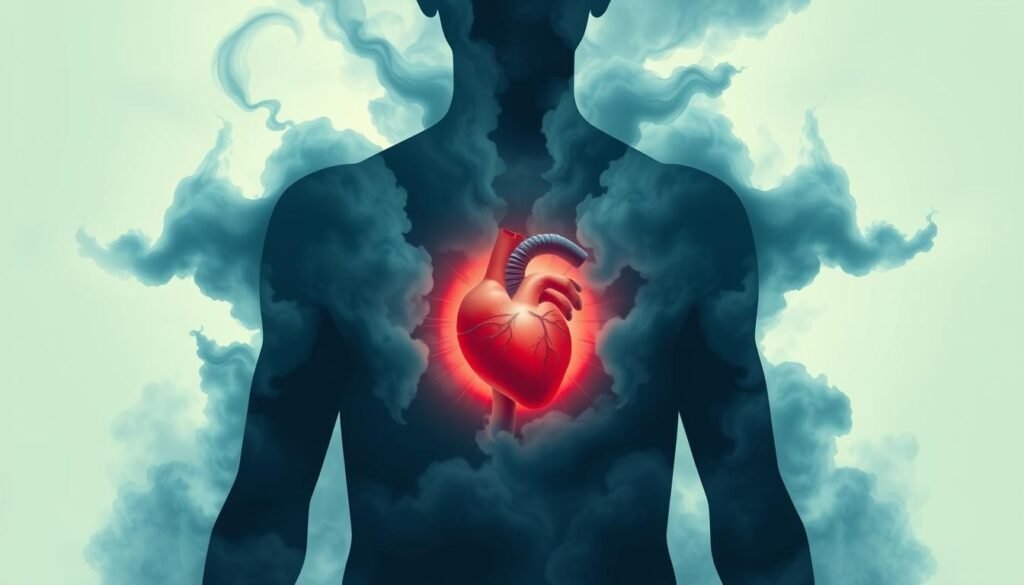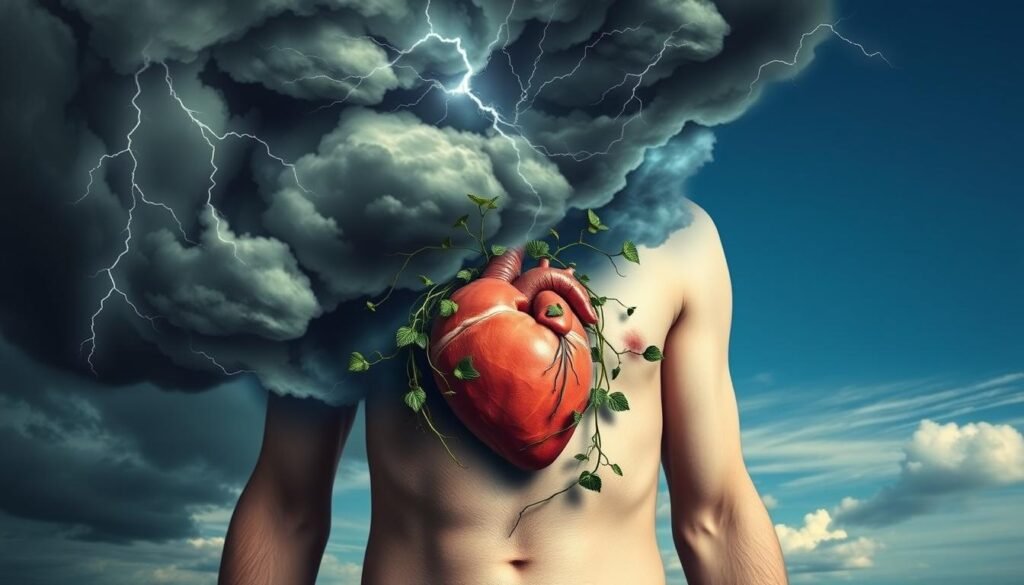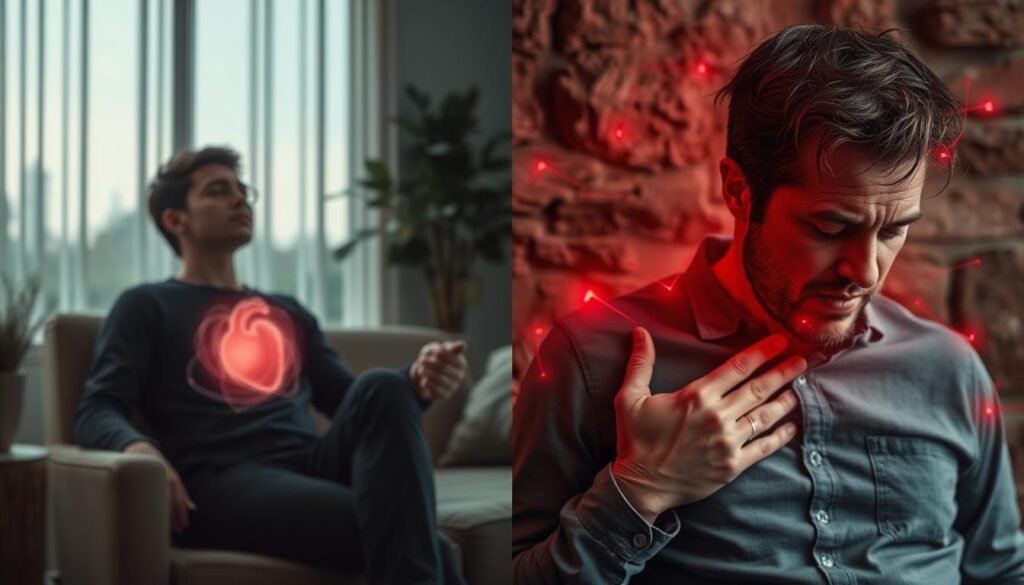Did you know up to 50 percent of people visiting emergency rooms for chest pain actually have anxiety? This fact shows how our feelings can affect our body in physical ways. People often think it’s just being nervous, but anxiety can cause real, scary symptoms like feeling a tight chest. Knowing the link between anxiety and chest tightness is important. Without this knowledge, many might think they have heart issues, which can scare them even more.
In this article, we take a closer look at how anxiety can make your chest feel tight. We’ll explain the different types of chest pain. And we’ll share tips on how to manage stress better. By understanding more about this, you could feel less scared. It could also help you handle anxiety in healthier ways.
Key Takeaways
- Anxiety can cause physical signs like chest tightness.
- Many people wrongly think their anxiety symptoms come from the heart.
- Learning how to manage stress can reduce anxiety-related chest pain.
- It’s vital to know the difference between chest pain from anxiety and heart issues.
- Knowing about panic attacks can help people get the help they need faster.
Understanding Anxiety and Its Physical Symptoms
Anxiety is our body’s way of reacting to danger. It kicks off the stress response. This includes changes like faster heartbeats, breathing quickly, sweating more, and feeling tight in the body. It’s important to notice these signs to understand our feelings and their effects on us.
While anxiety is normal, it can turn into anxiety disorders for some. They worry a lot about daily things, more than usual. Generalized anxiety disorder means always feeling anxious and having physical problems because of it. Panic disorder leads to sudden, extreme fear or panic attacks that spike the anxiety quickly.
Social anxiety disorder makes social situations very hard. It brings up a lot of worry about being embarrassed. Specific phobias cause a lot of anxiety about certain things or situations, sometimes causing panic attacks. There are other kinds too, like anxiety from substance use or separation anxiety in kids. They show anxiety can affect people in many different ways.
It helps to learn about the different types of anxiety disorders. This knowledge can make a huge difference in someone’s life. Specialists, like at the Mayo Clinic, can guide people through these issues. Knowing more about anxiety helps us understand when it’s becoming a serious problem for our health.
What is Chest Tightness?
Chest tightness feels like pressure or a heavy feeling in your chest. It can make you feel worried. People feel it differently. Some might feel sharp pain, others dull aches, or even a burning sensation. It’s important to know these signs. They help us understand why chest tightness happens, like from anxiety.
Chest tightness can happen for many reasons. Anxiety is a common cause, but it’s not the only one. Things like heart disease can also make your chest hurt. This pain might feel intense. It could relate to family history or how you live. Anxiety chest pain, on the other hand, pops up out of nowhere. It may come with heart beating fast or feeling dizzy, especially when you’re stressed.
Chest tightness is a sign that we shouldn’t ignore. It tells us to pay attention and figure out what’s wrong. When we know what causes it, we can help make it better. This reduces the worry chest tightness brings.

The Connection Between Anxiety and Chest Tightness
Anxiety shows up not just in our minds, but it can affect our bodies too. Chest tightness is one way it does this. When we’re anxious, our heart beats faster and our muscles tense up. This can make our chest feel tight.
During stress, our body goes into fight-or-flight mode. It releases adrenaline and cortisol. This can cause a tight feeling in our chest.
Chest tightness might happen before or during anxiety attacks. Fast breathing can make this feeling worse. Bloating, gas, or heartburn can add to the discomfort. To help with this, try changing your diet or how you sit after eating.
Slowing down your breathing can help calm the body’s stress response. Anxiety-related chest tightness usually doesn’t last long. It won’t spread to your back, arms, or shoulders. But it’s important to talk to a doctor to rule out other issues. For more support, check out Talkiatry.

Managing anxiety over time can reduce chest tightness episodes. Activities like working out and learning how to handle stress better are key. They can lower the chances of panic attacks and their symptoms. By understanding how anxiety and chest tightness are linked, we can start to improve our health.
There are effective ways to feel better and take control of your well-being. For tips on dealing with anxiety and chest tightness, visit Mood Care Health.
Recognizing Symptoms of Anxiety Induced Chest Pain
Anxiety can cause different types of chest pain. This confusion is common among those affected. Knowing the types associated with anxiety helps in managing them. It’s vital to tell apart anxiety-related pain from serious health issues.
Types of Chest Pain Associated with Anxiety
Common sensations related to anxiety chest pain include:
- Sharp pains that may come and go unexpectedly
- Dull aches that linger for extended periods
- Burning sensations often felt deep in the chest
- Muscle spasms affecting the chest area
- Tightness or pressure similar to a heavy weight pressing down
Pain from anxiety is felt differently by everyone. Some feel sharp or stabbing pains. Others might have tightness or an achy feeling. Around 70% of emergency room visits for chest pain are due to anxiety, not heart problems.
The time and strength of the chest pain from anxiety change a lot. Anxiety attacks range from short to several hours. Recognizing these patterns helps people deal with their anxiety better. They can find ways to cope, which might include changing their lifestyle or learning relaxation methods.
Differentiating Anxiety Chest Pain from Heart Attack Symptoms
It’s key to know the difference between chest pain from anxiety and heart attacks. Each comes from different causes. Knowing which is which can tell you if you need urgent medical help or to manage anxiety.
Common Symptoms of Heart Attacks
Heart attacks show different signs from panic attacks. Key symptoms include chest pain that feels like tight squeezing. You might feel pain in your arms, back, neck, jaw, or stomach. You may also get short of breath, have cold sweats, feel sick, or light-headed.
The symptoms often start slowly and get worse with activity. This kind of chest pain is very painful.
How to Identify Panic Attacks
Panic attacks come from your body’s reaction to fear. You might feel sharp chest pain that goes away quickly. You could also have a fast heartbeat and sweat a lot. Other signs are shaking, feeling like you can’t breathe, or getting dizzy.
These symptoms usually don’t last long, ending in a few minutes or up to an hour. Knowing this can help tell apart heart attacks and anxiety. These attacks are often caused by stress and are common in people with anxiety disorders.

If you have chest pain or other signs of a heart attack, get medical help right away. Learning the differences between panic attacks and chest pain from anxiety can help you feel more at ease. For more details, check out this resource.
| Symptom | Heart Attack | Panic Attack |
|---|---|---|
| Onset | Gradual | Sudden |
| Chest Pain Duration | Persistent | Minutes to an hour |
| Radiating Pain | Arms, back, neck, jaw, stomach | Not typical |
| Accompanying Symptoms | Cold sweats, nausea, shortness of breath | Rapid heartbeat, sweating, trembling |
What Causes Anxiety Chest Pain?
Anxiety can lead to various physical reactions, including chest pain. This happens because anxiety causes an adrenaline rush, making the heart beat faster and chest muscles tighten. Around 30% to 40% of people with low-risk chest pain in emergency rooms say it’s due to anxiety. This fact shows how mental health impacts our bodies.
Stress cardiomyopathy is a condition that stress can cause. It feels like a heart attack and happens when someone is very anxious. People might feel a sharp pain, tightness, or a dull ache in their chest. This kind of pain usually comes suddenly and goes away in about 10 minutes.
Psychological factors play a role in chest pain for up to 58% of patients, linking anxiety to physical symptoms closely. Managing anxiety through deep breathing, exercise, and relaxation methods like yoga helps. Keeping a journal and living healthily, with enough sleep and a good diet, is also key to handling anxiety and chest pain.
| Condition | Key Characteristics | Management Strategies |
|---|---|---|
| Anxiety Induced Chest Pain | Sharp or stabbing pain, tightness, or dull ache; quick onset and resolution | Deep breathing, physical activity, therapy, managing sleep and diet |
| Stress Cardiomyopathy | Mimics heart attack symptoms, occurs due to prolonged stress | Therapy, medication, lifestyle changes |
| Physical Symptoms of Anxiety | Varied manifestations; may include hyperventilation | Cognitive behavioral therapy, relaxation techniques |
Effective Stress Management Techniques
It’s crucial to manage stress for good mental health. This is especially true when it comes to anxiety and how it makes your body feel. For example, it can make your chest feel tight. There are many ways to help you feel in control and lessen these bad feelings. Two important methods are deep breathing and paying attention to the present, which can greatly help your mind.
Breathing Exercises for Relief
Breathing exercises are simple but very powerful in fighting stress. There are techniques like box breathing and breathing through pursed lips that bring calm. They can slow down your heartbeat and reduce your blood pressure, offering quick relief when you’re upset. Making these deep breathing exercises a part of your daily life helps you deal with tough moments better.
For a detailed guide on these techniques, check out this resource.
Mindfulness Techniques for Anxiety
Adding mindfulness into your day can shift your focus from worrying thoughts to what’s happening right now. Using methods like the body scan meditation and imagining peaceful scenes can bring you calm and cut down tension. Around 80% of people say mindfulness meditation really helps manage stress. It also can improve how well you sleep and your overall health.
Trying out different calmness strategies is a good idea since everyone is different. To learn more about how anxiety and body reactions are linked, read this article.
Anxiety Disorders and Their Role in Chest Tightness
Anxiety disorders are complex conditions that affect people mentally and physically. It’s important to know they can cause chest tightness. This shows how anxiety impacts our physical health, especially through chronic discomfort.
Common anxiety disorders are generalized anxiety disorder, panic disorder, and PTSD. Women are twice as likely as men to have these issues. Panic disorder often causes chest pain. About 22% to over 70% of these cases result from panic attacks. A study showed 18% to 25% of people with chest pain at emergency departments had panic disorder.
Ignoring anxiety disorders can lead to more health problems. For example, men with panic disorder have a higher risk of heart disease. This highlights why we must treat anxiety early. Treatments like cognitive-behavioral therapy and SSRIs can relieve anxiety and chest tightness.
Self-care is key in dealing with anxiety’s physical effects. Doing regular exercise, eating well, and getting enough sleep helps manage symptoms. With the right treatment and support, people can handle anxiety’s impact on their health better.
Learning about anxiety’s causes and treatments gives people tools to tackle this serious health issue effectively.
Conclusion
Knowing how anxiety connects to chest tightness helps us make smart health choices. Many people feel chest pain because of anxiety. This leads to worry and often unnecessary trips to the doctor. It’s key to understand that these feelings, while upsetting, are manageable.
When we realize these symptoms, we can find ways to cope. Methods like deep breathing and being mindful help a lot. Changing our lifestyle can also ease the symptoms. Doing this improves our lives by easing the pain that comes from anxiety.
Getting help for anxiety is a step towards better health. If you often feel chest pain, it’s good to see a doctor. They can tell if it’s anxiety or something more serious. Taking action improves our health and makes our lives more enjoyable.